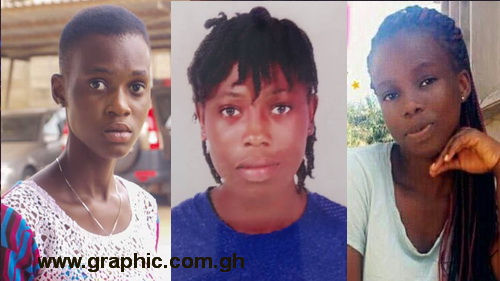The Head of the Ghana Police Forensic Laboratory, Supt Dr Kofi Adjapong Afrifah, has said the DNA tests to determine whether there is a relationship between the missing Takoradi girls and the skeletal humans found in a septic tank and a well in Takoradi are far advanced and the results will be announced soon.
Speaking on the latest edition of the Ghana Police Watch television series to be aired at 6 p.m. on the JoyNews channel and 6.45 p.m. on DGN tonight, September 13, 2019, Supt Dr Afrifah confirmed for the first time that the DNA had been successfully extracted from the skeletal human remains.
He added that he and his team had done a meticulous job, checked and double-checked and assured the nation of very accurate results.
“Exhibits were submitted to us in pristine condition. Our work as scientists is to unravel the science behind what had gone on. We have done that and when the results are released, everybody will be convinced,” Supt Dr Afrifah said.
The saga of the Takoradi girls started in July 2018 when 19-year-old Ruth Abakah went missing at Diabene; Priscilla Blessing Bentum, 21, got missing at Kansaworodo on August 17, 2018 and Ruth Love Quayson, 18, got lost at Butumagyebu Junction on December 4, 2018. Priscilla Mantebea Koranchie, 18, went missing on December 21, 2018 at Nkroful.
After some initial hesitation, the families of the missing girls agreed and gave samples for DNA testing on August 14, this year.
Yes or no?
The upcoming Ghana Police Watch programme, which also has International Relations expert and Director and Dean of Academic Affairs of the Ghana Armed Forces Command and Staff College, Dr Vladimir Antwi-Danso, as a discussant, seeks to provide further information on the progress of the DNA tests.
Both Supt Dr Afrifah and Dr Antwi-Danso agreed on the show that the only options available to police forensic scientists were to let the public know whether it was a ‘no’, meaning the remains are not those of the missing girls, or ‘yes’ to confirm that they are actually those of the girls.
Dr Antwi-Danso said he was aware the Police Forensic team had done an efficient job, knowing their credibility would be thrown out of the window if they didn’t deliver accurate results.
“If the results say ‘no’ and that the remains do not match samples for the test offered by surviving relatives, it means the police have more work to do. They must identify the persons whose bones are in their possession and who killed those people. They must also carry on with investigations to find the four girls.
“If the results turn out to be a ‘yes’, it is going to be a traumatic moment for the whole nation and we must all support and mourn with the families. All must help heal the wound bestowed on us by criminals,” he said.
Supt Dr Afrifah explained the processes for the DNA testing and said if the results indicated a ‘no’, it would be a 0.00 per cent no. If ‘yes’, it would be a 99.99 per cent yes.
The weekly Ghana Police Watch television series is in collaboration with the Ghana Police Service and produced by Creative Storm Networks.

